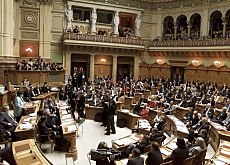
Minister widens the ethics debate

Defence minister Samuel Schmid has called on every Swiss person to shoulder a share of the burden for the country's ethical wellbeing.
Speaking on Friday, Schmid dismissed the notion that preserving the moral health of the country lies in the sole hands of politicians, business leaders and lawmakers.
The minister made his address in Zurich at the unveiling of a new study by the Lassalle Institute into ethics in Swiss politics. The Ethics 2006 report featured responses by more than 800 Swiss politicians to a series of ethical questions.
Schmid used the example of a fictitious working class citizen, Rosa Müller, who could influence the direction Switzerland takes via the ballot box.
“This shows that ethics is not only a theme for the upper classes. For everyone this example shows that ethics is indivisible,” Schmid said.
“The ethical conditions for politicians are the same for Rosa Müller. She passes the final judgement on what we politicians invent, debate, by compromise change and finally draft as laws. She has the final yes or no and decides our destiny.
“Our country needs people who believe in ethical responsibility. People with courage, a sense of justice and common sense.”
Promoting ethics
A total of 833 politicians from government level to local authorities from across the range of parties contributed to the Ethics 2006 report.
The study was authored by Lassalle Institute, an organisation committed to promoting ethics through Zen philosophy, based in Edlibach, canton Zug.
The sociology institute at Zurich University and an spin-off of Zurich’s Federal Institute of Technology, Seed Sustainability, helped draft a list of questions for politicians.
Most politicians considered following their conscience, environmental responsibility and humanitarian principles to be the best way of defining political ethics.
When asked what influenced their political decisions, 98 per cent of politicians polled again listed following their conscience. Public welfare was also a consideration for 97 per cent.
Unsurprisingly, parties aligned to the right considered Switzerland’s asylum policy to be ethical, but left-leaning parties were less enamoured.
swissinfo
Ethics 2006 asked 3,685 politicians from government to local authority level a series of ethical questions.
A total of 833 responded to the survey.
The Lassalle Institute uses Zen traditions to promote ethics in business and society on a national and international level through seminars, workshops and consulting.
The organisation was formed following the creation of Lassalle House, a spiritual centre for inter-religious dialogue and the development of social consciousness founded by Zen master Niklaus Brantschen in 1993.

In compliance with the JTI standards
More: SWI swissinfo.ch certified by the Journalism Trust Initiative




























You can find an overview of ongoing debates with our journalists here . Please join us!
If you want to start a conversation about a topic raised in this article or want to report factual errors, email us at english@swissinfo.ch.